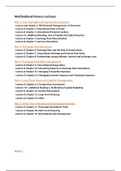College aantekeningen
Multinational Finance everything for the exam
- Instelling
- Radboud Universiteit Nijmegen (RU)
All lectures and chapters from Multinational Finance. Above every lecture is stated which chapter belongs with it. The information from the powerpoints + additional explanations coming from the book and the lectures. Examples, schemes and formulas are included as well.
[Meer zien]





